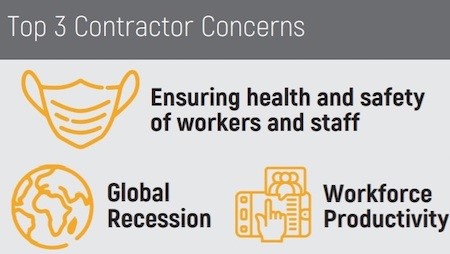98% of contractors affected by COVID-19 pandemic: OCS survey
Findings from a new survey prepared by the Ontario Construction Secretariat (OCS) show that nearly every respondent has been affected by the coronavirus pandemic, and that, absent changes to site shut-down rules, 16 percent of businesses would have to close their operations within three months.
 The Coronavirus Contractors Survey: Impacts and Actions survey took the pulse of 200 industrial, commercial and institutional construction companies across Ontario. The survey collected data from respondents between April 22 and 29. It therefore considered the ongoing effects of the provincial government order to close construction work on all but the most essential projects. It does not, however, consider the effects of the Ontario government’s April 30 decision to expand the definition of essential construction work on May 4.
The Coronavirus Contractors Survey: Impacts and Actions survey took the pulse of 200 industrial, commercial and institutional construction companies across Ontario. The survey collected data from respondents between April 22 and 29. It therefore considered the ongoing effects of the provincial government order to close construction work on all but the most essential projects. It does not, however, consider the effects of the Ontario government’s April 30 decision to expand the definition of essential construction work on May 4.
The survey found that 98 percent of respondents were impacted by the coronavirus to some extent. More than half reported that most of their work has stopped altogether. Among those that reported work stoppages, 64 percent said existing work has stopped completely; 65 percent said their scheduled work was delayed.
The survey went on to look at the extent to which contractors’ supply chains are being disrupted by the pandemic. Sixty-three percent said those chains had been impacted at a medium or high level, while 8 percent said their chains had not been affected at all. When asked to estimate how long it would take to resume their businesses to full operation after restrictions are lifted, nearly half (48 percent) said they could get back to full capacity within a month. A further 32 percent said it could take as much as three months to restore their operations.
When asked about the April 3 order by the provincial government to stop operations on all but essential construction projects, respondents said the decision impacted about 62 percent of their operations. More than 70 percent of respondents said the order was clear, while 6 percent found the directive very confusing. On balance, however, a majority of respondents (53 percent) agreed with the government’s directive.
Given the pandemic’s effects on productivity and supply chain operations, the survey also looked at the financial impacts of the pandemic. More than 80 percent said their revenues dropped from the previous year at an average of 42 percent. More than half said they would need support from government programs to keep their doors open. The survey also asked how long firms could continue in business absent any changes to shut down orders. Sixteen percent said they would have to close their operations within three months if restrictions were unchanged. A further 52 percent said they could not stay in business for a year.
The top three concerns identified by respondents during the pandemic were ensuring the health and safety of their workforce, the likelihood of a global recession and workforce productivity. Other prominent concerns included supply-chain disruptions, keeping their firms in business, and meeting contractual deadlines.
Respondents said they had taken a number of measures to address these concerns. They encouraged more frequent hand washing (88 percent), increased the availability of hand sanitizer and hand-washing stations (85 percent), and established procedures that allowed workers to call attention to unsanitary conditions (84 percent). In addition, 74 percent said they had laid off site workers, 42 percent said they laid off office staff, 43 percent provided financial support to workers who could not work, and 55 percent applied for government assistance.
Asked about the likely impact of the coronavirus pandemic on the future of the construction industry, respondents expected dramatic changes to cleanliness and site sanitation, major supply-chain disruptions, and delays to project planning.
“We knew COIVD-19 would have an impact on the construction sector especially after the April 3 shutdown and wanted to better understand the impact on contractors and how they were responding to the crisis,” says OCS director of research Katherine Jacobs. “The depth of the impact was particularly surprising. On the positive side, contractors were quick to respond to additional safety measures to protect the health and safety of their employees and note this was their number one concern.”
The OCS says it is planning additional iterations of the survey to further examine issues about supply chain disruptions, additional costs related to personal protective equipment, impacts on productivity, and what the resumption of construction will look like.
The complete survey document is available on the OCS website.








